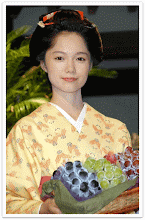Japanese Theater has had a long renowned tradition of rich classical tales and powerful dramatic performances. For most people living outside of Japan
Founded here in
 Set in the Edo Period, this play directed by Kaz Matamura follows the quest of lone Yakuza named Chutaro (played by Yoshi Ando of Good Soil and Letters from
Set in the Edo Period, this play directed by Kaz Matamura follows the quest of lone Yakuza named Chutaro (played by Yoshi Ando of Good Soil and Letters from  Along his journey, Chutaro encounters other old women in
Along his journey, Chutaro encounters other old women in
Rejected, Chutaro is devastated. All of his hopes and dreams are now gone. He has seen that Ohama is living a life of luxury and has no need of his 100ryo but chooses in an all too classical Japanese gesture of leaving his coin purse behind. This action moves Otose and it becomes painfully clear that Chutaro is indeed her long lost son who she had convinced herself that he had died long ago. Both Ohama’s servants and Otose recognize Chutaro’s likeness to Ohama as possibly being a potential lost family member. Together they convince Ohama that Chutaro is truly her lost son she abandoned when she left Chutaro’s father many years ago. Ashamed, Ohama loses her stoic arrogance and breaks down in tears. All is brought to bear but is brought full circle by the comforting kind words of Otose for her long lost brother and her appreciation for all that her mother has provided her. Accepting Ohama’s new reality, Ohama flies into a panic to chase after Chutaro but by now he is long gone. Complicating matters, Ohama’s men having assumed Chutaro to be a troublemaker or a beggar have hired a down and out Samurai Tobata (played by Yoshitomo Kaneda) to dispatch him. Ohama joined by her daughter Otose races to find Chutaro before it is too late.
Mutaba no Haha lived up to every expectation of Japanese theater and raised the bar to new heights in dramatic performances. The all Japanese cast included Yoshi Ando, Yoshitomo Kaneda, Mina Oba, Mie Aso, Yoshi Murakami, Kazumi Zatkin, Akiko Katagiri, Mai Kobayashi, Sachiko Mori, and others including and not to say the least the legendary Sayoko Shirotani who flew in from Japan just to play in this production. Toshiro Mifune’s influence could be seen in Yoshi Ando’s performance with elements of Sanjuro and the deep expressiveness of Hiroyuki Sanada as Seibei in Twilight Samurai. I am very honored to call my old fellow Shinkendoka Mr. Ando my friend. I recommend you watch his career with great interest. Arigato Kai has worked hard to bring Japanese theater to American audiences. As I explained to Yoshi Ando that this should not be looked upon as the most arduous task for American audiences who already like Japanese Theater either know Nihongo or are comfortable with subtitles. In any case any American with a thirst for good theater will appreciate the hard work of the cast and crew of Arigato Kai and we at American Mishima believe you will too!
To find out more about Arigato Kai and their future productions Please visit: Arigato Kai
Enjoy!



























No comments:
Post a Comment